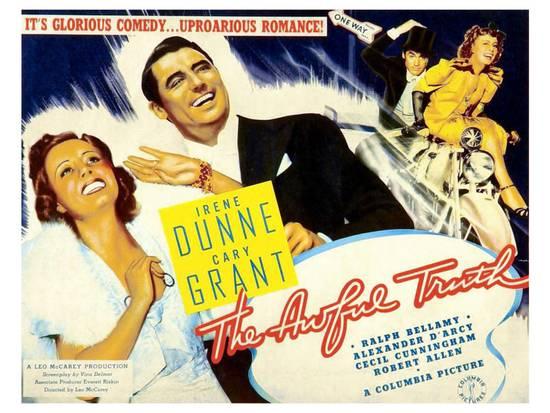In this expertly made comedy, directed by the great Leo McCarey, Cary Grant and Irene Dunne play a married couple that can’t stand each other any longer and want a divorce – but don’t want the other person to be with anyone else either.
The Production: 4.5/5
The Awful Truth is many things. It’s a fantastic screwball comedy. It’s a well-directed tale expertly spun by director Leo McCarey, whose reputation for throwing away the script and finding it on the stage was no doubt instrumental to the success of the finished film. It’s a breakout film for Columbia Pictures, one of the then-poorest studios that was looking to expand on the prestige that director Frank Capra had won for them. It’s an opportunity for the wonderful actress Irene Dunne, who saw herself as more of a dramatic performer, to let loose. But most of all, The Awful Truth is the dividing line in Cary Grant’s filmography; there’s everything he made before, and everything after. Before, though still credited as Grant, he’s basically Archie Leach – a handsome, if slightly awkward, young man of indistinct presence and intermittent charm, capable of making a good impression but just as easily forgotten at the end of the picture. After, his star power was undeniable, his charm irrefutable. The Awful Truth is the moment where it all came together for Grant.
In a screwball comedy, the plotting is often less important than the specific combination of actors and talent, but with that said, The Awful Truth does have a great setup. Jerry Warriner (Grant) returns home from a trip to discover that his wife Lucy (Dunne) is not at home as she should be. When she does return, it’s with a handsome music teacher in tow; Lucy insists that the two needed to find lodging when travel conditions became inhospitable, but that nothing untoward had happened. Enquiring about Jerry’s trip, she discovers that he was not in Florida as he claimed, but somewhere else. An argument ensues, where Lucy questions why Jerry is allowed to behave suspiciously without consequence but she herself is not. Before long, the couple agree to divorce, and a judge gives them a trial separation period before the divorce becomes official. Soon, Lucy has taken up with a new-money oilman, Dan Leeson (Ralph Bellamy), who is not only the complete opposite of Jerry but also a total mismatch for Lucy. Because Jerry and Lucy had owned a dog together, and because the divorce judge had given them joint custody over the pet (played by Skippy, best known as Asta from the Thin Man series of films), Jerry is able to witness just how bad this pairing is, and takes a certain delight in seeing Lucy doubling down on the new relationship. As Lucy tries to show that she’s moved on from Jerry, Jerry finds himself falling even more in love with her; and when Jerry tries to show that he too is ready to move on, Lucy only becomes more interested in him.
The cast is first rate. Grant gives the first fully recognizable “Cary Grant performance” here, while Dunne is every bit his equal. Whether it’s Grant using his acrobat training to install a certain physicality into every stumble and pratfall, or Dunne slipping a subtle laugh into an otherwise tightly controlled bit of singing, each is able to make their character both larger than life while remaining recognizably human. The screen chemistry between the two is undeniable, and they would pair again for two more features. (Their next film would be My Favorite Wife, produced but not directed by McCarey, which has a similar screwball theme, though is not quite as inspired. Their final film, Penny Serenade, was the type of weepy melodrama popular at the time, but Grant and Dunne’s chemistry is able to elevate that film into something more memorable than its script might suggest.) Special mention must also be made of Ralph Bellamy, who expertly plays the film’s most unglamorous role; as Dan Leeson, he has to appear as man lacking all sense of self-consciousness, a man who genuinely believes himself to be a high class sophisticate but who constantly proves himself as being anything but. The more genuine that Bellamy’s feelings appear, the more trapped Dunne becomes, which only increases the delight of both Grant in the film and the viewer at home. Just as Grant and Dunne would go on to play similar parts with each other again, so would Grant and Bellamy. In just three years, Bellamy would again play the rebound for another ex-wife of Grant’s, in His Girl Friday, also for Columbia.
The Awful Truth represents an interesting place in McCarey’s career. Prior to it, he had spent time as a contract director for Paramount. In that time, he worked on a variety of projects, including perhaps the greatest Marx Brothers film of all time (Duck Soup) and a fun if slightly bizarre road movie featuring early performances by greats like George Burns, Gracie Allen and W.C. Fields (Six Of A Kind). McCarey made two films in 1937, first completing the somber Depression-era tearjerker Make Way For Tomorrow for Paramount, before moving on to Columbia for The Awful Truth. When he won the Best Director Academy Award for The Awful Truth, he famously remarked that he had won for the wrong picture. But while Make Way For Tomorrow is indeed a well-made and heartbreaking film, the Academy wasn’t wrong to recognize that The Awful Truth was the more significant achievement. McCarey would go on to work with Grant again, including twice more as a director. Their World War II-era collaboration, Once Upon A Honeymoon, is an almost uncharacterizable blend of comedy, drama and Nazi intrigue that shouldn’t work but somehow does. And of course, their most famous collaboration would be An Affair To Remember, which is actually a remake of an earlier McCarey film. But the light, sophisticated and almost anarchic touch that McCarey brought to The Awful Truth would remain a tool in Cary Grant’s arsenal that Grant would draw from again and again throughout the rest of his impressive career. In a career full of great highlights, bringing the “Cary Grant” persona to the world may be the greatest of all.
Video: 4/5
3D Rating: NA
The Awful Truth is presented in its original aspect ratio of 1.37:1 via the AVC codec. The master used on this Criterion Collection release derives from a recent 4K restoration performed by Sony and represents a major upgrade from Sony’s previous DVD release. Cleanliness and stability have been tremendously improved, with this new restoration showing only the faintest hints of wear. Unfortunately, the original camera negative has long since been lost, and the materials utilized in this restoration were several generations away from that original negative. Clarity and sharpness are not particularly strong, and fine detail can be lacking. However, those are ultimately minor concerns, as what’s presented here retains a beautiful film-like look, and is a tremendous improvement over previous home video versions.
Audio: 4/5
The audio on this release is presented in 1.0 mono in the uncompressed PCM format. It is also an improvement over its DVD counterpart, and generally even and balanced sounding. Despite the sometimes improvisatory nature of the film’s production, dialogue is well recorded and easy to understand, an essential requirement for a screwball comedy packed with such witty writing. There is a mild and slight hiss which underlays parts of the film; it’s never distracting and may not be noticeable to many listeners.
Optional English SDH subtitles are included.
Special Features: 3/5
Lux Radio Theatre Radio Adaptation (59:39, audio only) – This radio adaptation of the play, originally broadcast on September 11, 1939 and hosted by Cecil B. DeMille, features Cary Grant recreating his original role from the film. Claudette Colbert plays the Irene Dunne role. This is an enjoyable listen, presented here in better quality than the versions that frequently circulate online. Though Colbert isn’t as good in the role as Dunne, and though the visual shenanigans are missed in an audio-only environment, Grant excels as a radio performer.
Tell Me Lies About Cary Grant (15:59, HD) – Film critic David Cairns narrates this audio essay (set over video clips and stills from Grant’s filmography) about the career of Cary Grant, and how Leo McCarey was instrumental in helping the actor hone his screen persona. Though the piece is enjoyable, there are a lot of slight factual errors contained within the piece that seem to be a result of sloppy fact-checking. The general gist is correct, but the finer details are off. For instance, the piece says that no one used the accent that Grant used; however, many of Grant’s contemporaries also adopted the same mid-atlantic accent (also called the transatlantic accent) that he relied on. The piece also erroneously suggests that Grant invented the name “Cary Grant” on his own during his pre-Hollywood years, when the truth is that he picked the name after signing with Paramount. It’s disappointing that a piece that gets so much of the broad outline correct makes such sloppy mistakes. With very limited behind-the-scenes video material about Grant’s career in circulation, this piece may be the first exposure many audiences have to information about Grant’s life, and it seems irresponsible that the piece made it to the disc with so many errors present.
From Slapstick To Screwball: Leo McCarey’s The Awful Truth (24:02, HD) – Film critic Gary Giddins appears on camera to discuss director Leo McCarey’s life and career, and how The Awful Truth fits into his filmography. More factually accurate than the David Cairns piece above, there is still an awkward factual mistake in this piece, when Giddins incorrectly states that The Awful Truth won the Academy Award for Best Picture. (While it did win Best Director, it was not a Best Picture winner.)
Irene Dunne On The Awful Truth (06:52, HD) – This is an archival interview from 1978 with star Irene Dunne, as conducted by James Harvey. Stills and film clips are used to provide visual accompaniment. The quality of the audio recording is somewhat unclear and occasionally faint, but it is worthwhile to hear Dunne’s thoughts on the production process. Interestingly, while Dunne confirms that much of the film was improvised, she states that none of the dialogue was improvised on-camera. Rather, McCarey and the cast would improvise on-set during rehearsal, and then McCarey would write new dialogue based on those improvisations for the actors to deliver.
Booklet – The package also includes a booklet with a detailed essay by film critic Molly Haskel. While some may not agree with all of Haskel’s assertions about McCarey’s career (in praising McCarey, she sometimes seems to go out of her way to dismiss the talents of those who appeared in his films), it is nonetheless a well-researched and insightful scholarly essay on the film and the talent that made it.
Overall: 4.5/5
The Awful Truth is an early career milestone for Cary Grant, and some of the best work from co-star Irene Dunne and director Leo McCarey. The chemistry of the two leads is phenomenal, and director McCarey’s loose and lively direction keeps the film moving effortlessly from start to finish. Though the loss of the original camera negative means that this restoration doesn’t measure up to the high standard Sony set with their work on Mr. Smith Goes To Washington, it is at least equal to (if not better than) their restoration for You Can’t Take it With You. In other words, if the film doesn’t look quite pristine, it’s still a major upgrade from all previous home video versions. To Sony’s restoration, Criterion adds an uneven collection of extras which are unfortunately marred by some factual inaccuracies. But these are ultimately small quibbles. The Awful Truth is one of the great screwball comedies, and this edition from Criterion allows that greatness to shine through.
Post Disclaimer
Some of our content may contain marketing links, which means we will receive a commission for purchases made via those links. In our editorial content, these affiliate links appear automatically, and our editorial teams are not influenced by our affiliate partnerships. We work with several providers (currently Skimlinks and Amazon) to manage our affiliate relationships. You can find out more about their services by visiting their sites.






Similar threads